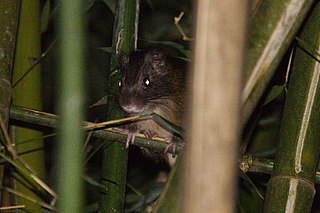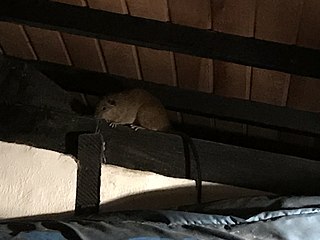
The black rat, also known as the roof rat, ship rat, or house rat, is a common long-tailed rodent of the stereotypical rat genus Rattus, in the subfamily Murinae. It likely originated in the Indian subcontinent, but is now found worldwide.

The painted tree-rat is a species of spiny rat from Brazil, restricted to north-eastern Bahia in eastern Brazil. It is the only species in the genus Callistomys.
The giant tree-rat is a species in the family Echimyidae, the spiny rats. It is the only species in the monotypic genus Toromys. It is endemic to Brazil, where it occurs in the flooded forest along the banks of the Amazon River and its tributaries.

The Atlantic bamboo rat, or southern bamboo rat, is a spiny rat species found in humid tropical forests in Argentina, Brazil and Paraguay. It is the only member of the genus Kannabateomys.
The tuft-tailed spiny tree rat is a spiny rat species from Brazil south of the Amazon River, where it has been found in grassland and gallery forest. It is the only species in the genus Lonchothrix. Very little is known about this rodent. It is small with an average adult weight of about 138 grams. It is nocturnal and solitary in habits.
The golden Atlantic tree-rat is a spiny rat species found in Brazil.
The orange-brown Atlantic tree-rat or red-nosed tree-rat, is a spiny rat species found in Brazil.
The Drab Atlantic tree-rat is a spiny rat species found in Brazil.
Kerr's Atlantic tree-rat or Moojen's Atlantic tree rat, is a spiny rat species found in Brazil.
The Mantiqueira Atlantic tree-rat is a spiny rat species found in Brazil.
The long-furred Atlantic tree-rat or Thomas's Atlantic tree-rat, is a spiny rat species found in Brazil. In recent years, this species have unveiled itself in different parts of Brazil where researchers and scientists are still closely looking into due to lack of knowledge on this species. The Phyllomys medius is closely related to two other species that have recently been connected to the long furred Atlantic tree rat due to similarities in physical characteristics and DNA.
The rusty-sided Atlantic tree-rat, is a spiny rat species found in Brazil.

The giant Atlantic tree-rat is a spiny rat species from Brazil. It is endemic to São Sebastião Island off the coast of São Paulo State. The island is largely protected by the Ilhabela State Park.
The short-furred Atlantic tree-rat or Wagner's Atlantic tree rat, is a spiny rat species found in Brazil.
Phyllomys is a genus of arboreal spiny rat, geographically restricted to the forests of eastern Brazil.

The red-crested tree-rat or Santa Marta toro is a species of tree-rat found in the monotypic genus Santamartamys in the family Echimyidae. It is nocturnal and is believed to feed on plant matter, and is mainly rufous, with young specimens having a grey coat. IUCN list the species as critically endangered: it is affected by feral cats, climate change, and the clearing of forest in its potential range in coastal Colombia.
The pallid Atlantic tree-rat is a species of rodent in the family Echimyidae. It is a species of spiny rat. It is endemic to Brazil, where it is found from Paraiba to Minas Gerais.

The prehensile-tailed hutia is a small, furry, rat-like mammal found only in forests on Cuba. It is the only member of the genus Mysateles. It climbs and lives in trees where it eats only leaves, and it is threatened by habitat loss. The prehensile-tailed hutia is a member of the hutia subfamily (Capromyinae), a group of rodents native to the Caribbean that are mostly endangered or extinct.
The black-spined Atlantic tree-rat,, is a South American spiny rat species in the family Echimyidae. It is found in southeastern Brazil, where it inhabits moist broadleaf forest and semideciduous forest in the Atlantic Forest region. It is arboreal and is believed to build nests of leaves in trees. Its karyotype has 2n=52.






